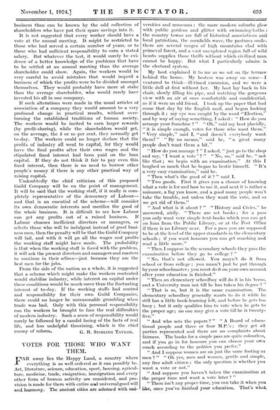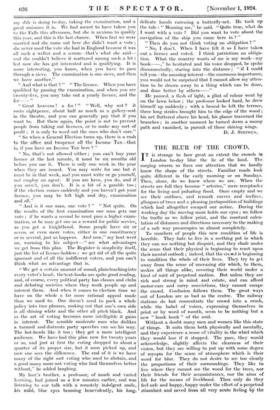VOTES FOR THOSE WHO WANT THEM.
FAR away lies the Happy Land, a country where everything is as well ordered as it can possibly be. Art, literature, science, education, sport, housing, agricul- ture, medicine, trade, emigration, immigration and every other form of human activity are considered, and pro- vision is made for them with entire and universal good will and. harmony. The ancient cities are adorned with uni- versities and museums ; the more modern suburbs glow with public gardens and glitter with swimming-baths.; the country towns are full of historical associations and local patriotism, the cornfields wave, the pastures smile, there are several ranges of high mountains clad with primeval forest, and a vast unexplored region full of wild beasts supplies those thrills without which civilized man cannot be happy. But what I particularly admire is the electoral system.
My host explained it to me as we sat on ttie terrace behind the house. My hostess was away on some—I ventured to think—ill-timed excursion, and we were a little dull at first without her. My host lay back in his chair, slowly filling his pipe, and watching the gorgeous view with an air at once comfortable and confidential, as if it were an old friend. I took up the paper that had come that day by the English mail, and began looking through it ; my eye was caught by the word "Election,'' and by way of saying something, I asked : " How do you arrange your franchise ? " " Oh," said my host placidly, " it is simple enough, votes for those who want them." " Very simple," said I, "and doesn't everybody want them? " " By no means," said he, " a great many people don't want them a bit."
" How do you manage " I asked, " just go to the shop and say, ' I want a vote ' ? " " No, no," said he, " not like that ; we begin with an examination." At this I laughed so much that he began to bestir himself. " It's a very easy examination," said he.
" Then what's the good of it ? " said I.
" Two goods. First it gives you a chance of knowing what a vote is for and how to use it, and next it is rather a nuisance, a fag you know, and a good many people won't take the trouble, not unless they want the vote, and so we get rid of them."
" And what is it about ? " " History and Civics," he answered, airily. " There are set books ; for a pass you only want very simple text-books which you can get on loan from the Public Library, or at the Post Office if there is no Library near. For a pass you are supposed to be at the level of the upper standards in the elementary schools ; if you want honours you can get coaching and read a little more."
" Then I suppose in the secondary schools they pass the examination before they go to college ? "
" No, that's not allowed. You mayn't do it from school or from college ; you musn't just be put through by your schoolmaster; you must do it on your own account after your education is finished."
" Then an elementary schoolboy will do it in his 'teens, and a University man not till he has taken his degree ? "
" That is so, but it is the same examination. The elementary schoolboy generally wants to do it while he still has a little book-learning left, and before he gets too busy ; but it only qualifies him to vote when he gets to the proper age; no one may give a vote till he is twenty- five."
" And who sets the papers ? " " A Board of educa- tional people and three or four M.P.'s ; they get all parties represented and there are no complaints about fairness. The books for a simple pass are quite colourless, and if you go in for honours you can choose your own coach according to the politics you prefer." " And I suppose women are on just the same footing as men ? " " Oh yes, men and women, gentle and simple, any free adult citizen ; the only question is whether you want a vote or not."
" And suppose you haven't taken the examination at the proper time and want a vote later ? "
" There isn't any proper time, you can take it when you like, once you've finished your education. That's what; my 'fife is doing to-day, taking the examination, and a great nuisance it is. We had meant to have taken you to the Falls this afternoon, but she is anxious to qualify this year, and this is the last chance. When first we were married and she came out here she didn't want a vote ; she never used the vote she had in England because it was all such a welter and a scrum—that's what she said— and she couldn't believe it mattered among such a lot ; but now she has got interested and is qualifying. It is more interesting, you know, when you have to pass through a sieve. The examination is one sieve, and then we have another."
" And what is that ? " " The licence. When you have qualified by passing the examination, and when you are twenty-five, you may take out a yearly licence, and the kc-- " " Great heavens ! a fee ! " " Well, why not ? it costs eightpence, about half as much as a gallery-seat in the theatre, and you can generally pay that if you want to. But there again, the point is not to prevent people from taking out licences, or to make any sort of profit ; it is only to weed out the ones who don't care."
" So when a General Election turns up, there is a rush to the office and twopence off the Income Tax—that is, if you have an Income Tax here ? "
" No, that's not allowed either ; you can't buy your licence at the last minute, it must be six months old before you use it. There is only one week in the year when they are issued. You may write for one but it must be in that week, and you must write or go yourself, not employ an agent. If you are keen, you do, and if you aren't, you don't. It is a bit of a gamble too ; if the election comes suddenly and you haven't got your licence, you may be left high and dry, examination and all."
" And is it one man, one vote ? " " Not quite. On the results of the first examination one man gets one vote ; if he wants a second he must pass a higher exam- ination, or he may get one as a reward for public service, as you get a knighthood. Some people have six or seven, or even more votes, either in one constituency or in several, just as happens. And now," my host went on, warming to his subject —" see what advantages we get from this plan. The Register is simplicity itself, just the list of licence-holders ; we get rid of all the quite ignorant and of all the indifferent voters, and you can't think what an advantage that is.
" We get a certain amount of sound, plain teaching into every voter's head; the text-books are quite good reading, and, of course, every political party has classes and clubs and debating societies where they work people up and interest them. And when it comes to election time we have on the whole a far more rational appeal made than we used to. One doesn't need to pack a whole policy into two phrases, making out that one's own side is all shining white and the other all pitch black. And as the art of voting becomes more intelligible it gains in interest. The sensible moderate man who dislikes a turmoil and distrusts party speeches can see his way. The hot-heads like it too ; they get a more intelligent audience. We have had this plan now for twenty years or so, and just at first the voting dropped to about a quarter of its proper size, but it soon picked up, and now one sees the difference. The end of it is we have many of the right sort voting who used to abstain, and a good many more not voting who find themselves better without," he added laughing.
My hog:,'s brother, a professor, of much and varied learning, had joined us a few minutes earlier, and was listening to cur talk with a remotely indulgent smile, his mild, blue eyes beaming benevolently,- his long, delicate hands caressing a butterfly-net. He took up the tale : " Meaning me," he said. " Quite true, what do I want with a vote ? Did you want to vote about the navigation of the ship you came here in ? "
" Then do you not think voting an obligation ? "
" No, I don't. When I have felt it so I have taken out a licence and voted. I think patriotism an obliga- tion. What the country wants of me is my work—my book—," he hesitated and his voice dropped, he spoke disconnectedly, staring into the distance ; " if I could tell you—the amazing interest—the enormous importance, you would not be surprised that I cannot allow my atten- tion to be drawn away to a thing which can be done, and done better by others---" He paused, a flash of light, a glint of colour went by on the lawn below ; the professor looked hard, he drew himself up suddenly ; with a bound he left the terrace, three long strides brought him to the edge of the wood ; his net fluttered above his head, his glance traversed the branches ; in another moment he turned down a mossy path and vanished, in pursuit of those shining wings.
D. J. STEPHEN.











































 Previous page
Previous page